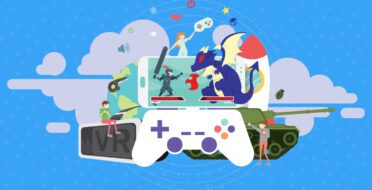The gaming world has witnessed a monumental shift with the rise of mobile gaming. Mobile devices have become ubiquitous, providing users convenient access to a vast array of games. But what makes these mobile games even more captivating and immersive? The answer lies in the integration of artificial intelligence (AI) technologies. AI has revolutionized the gaming industry, enabling developers to create more intelligent, dynamic, and engaging experiences for mobile gamers.
In this blog post, we will explore the fascinating realm of AI in mobile gaming. We will delve into how AI is utilized to enhance gameplay, improve player experiences, and push the boundaries of what is possible on mobile devices. From virtual assistants guiding us through challenging quests to AI-powered non-player characters (NPCs) with realistic behaviors, we will examine the impact of AI on mobile game development. Furthermore, we will explore the ways in which AI enhances multiplayer and social interactions in mobile games, bringing players together in exciting and dynamic ways.
Understanding AI in Mobile Gaming
Artificial intelligence refers to the ability of computer systems to exhibit intelligent behavior and make decisions that would typically require human intelligence. In the realm of gaming, AI encompasses algorithms and technologies that enable game characters, non-player characters (NPCs), and virtual opponents to exhibit intelligent behavior, react to player actions, and make dynamic decisions.
Types of AI algorithms commonly used in mobile games
Mobile games employ various AI algorithms to bring intelligent behaviors to life. Some commonly used algorithms include:
- Finite State Machines (FSMs): FSMs define a finite set of states for game characters or NPCs and transition between these states based on certain conditions or events.
- Behavior Trees: Behavior Trees provide a hierarchical structure for defining complex behaviors by breaking them down into smaller tasks and conditions.
- Pathfinding Algorithms: These algorithms help NPCs navigate through game environments by finding the most efficient paths while avoiding obstacles.
- Decision Trees: Decision Trees are used to model decision-making processes for NPCs, enabling them to make choices based on various conditions and priorities.
Role of machine learning in AI-powered mobile games
Machine learning plays a crucial role in AI-powered mobile games. By analyzing vast amounts of data, machine learning algorithms can learn and adapt, improving gameplay experiences. Some key applications of machine learning in mobile gaming include:
- Adaptive Difficulty: Machine learning algorithms can dynamically adjust the game’s difficulty level based on the player’s skill level and behavior, providing a more personalized and engaging experience.
- Player Profiling: Machine learning models can analyze player behavior, preferences, and patterns to create personalized recommendations, targeted offers, and customized experiences.
- Content Generation: Machine learning algorithms can generate game content, such as levels, maps, and quests, based on player preferences and design patterns, ensuring unique and tailored experiences.
By understanding the definition of AI in gaming, the types of AI algorithms commonly employed, and the role of machine learning, we can gain a deeper appreciation for the transformative power of AI in mobile gaming. In the following sections, we will explore how these AI technologies are applied in practice and their impact on the gaming experience.
AI in Mobile Game Development
AI technologies have revolutionized mobile game development, enabling developers to create more intelligent, immersive, and dynamic gaming experiences. This section will delve into the role of AI in mobile game development and highlight its various applications.
AI-driven game design and level generation
AI algorithms have become instrumental in automating game design processes. Developers can leverage AI to generate game levels, environments, and assets automatically, saving time and effort. These algorithms analyze player behavior, preferences, and game design principles to create challenging and engaging levels that adapt to individual players’ skill levels.
Procedural content generation and dynamic gameplay experiences
AI-powered procedural content generation (PCG) techniques offer a way to create infinite and diverse gaming experiences. By using algorithms to generate game content such as maps, quests, items, and narratives, developers can ensure that each playthrough is unique and exciting. PCG can also enable dynamic and adaptive gameplay, where game elements are generated in real-time based on player actions and environmental factors.
Adaptive difficulty and personalized gaming experiences
AI algorithms allow games to dynamically adjust their difficulty levels to match the player’s skill and preferences. By analyzing player behavior and performance, the game can adapt and provide challenges that are both engaging and fair. This adaptive difficulty ensures that players remain challenged without becoming frustrated, leading to a more enjoyable and personalized gaming experience.
AI-powered non-player characters (NPCs) and enemy behavior
AI plays a critical role in creating realistic and intelligent behaviors for NPCs and enemy characters. With AI algorithms, NPCs can exhibit lifelike movements, decision-making, and interactions with the player. From strategizing enemy AI in combat scenarios to creating believable virtual companions, AI enhances the immersion and excitement of mobile gaming.
By incorporating AI into mobile game development, developers can unlock new creative possibilities and deliver enhanced gaming experiences. From AI-driven game design and level generation to adaptive difficulty and lifelike NPCs, AI technologies are reshaping the way games are created and experienced on mobile devices. In the next section, we will explore how AI enhances the overall gaming experience for players, leading to more personalized and engaging interactions.
Enhancing Mobile Gaming Experiences with AI
AI technologies are revolutionizing the mobile gaming experience, offering new ways to enhance player engagement, personalization, and overall enjoyment. In this section, we will explore the various ways AI enhances mobile gaming experiences.
AI-driven player behavior analysis and personalization
AI algorithms can analyze player behavior, preferences, and gameplay data to gain insights into individual playing styles. This data-driven analysis allows for personalized recommendations, tailored challenges, and customized experiences. By understanding player patterns, AI can adapt the game’s content, difficulty, and rewards to provide a more immersive and enjoyable experience.
AI-based virtual assistants and in-game guidance
AI-powered virtual assistants can provide in-game guidance and support, helping players navigate complex gameplay, offer hints, or provide tips for advancing in the game. These virtual assistants leverage natural language processing and machine learning to understand player queries and respond with relevant and contextually appropriate assistance. By offering real-time guidance, AI-based virtual assistants enhance the overall gaming experience, especially for beginners or those seeking additional help.
AI-generated music, sound effects, and visual effects
AI algorithms can generate dynamic and adaptive music, sound effects, and visual effects that respond to player actions and game events. By analyzing gameplay data, AI models can generate immersive soundscapes, adaptive music tracks, and visually stunning effects that synchronize with the player’s progress, enhancing the overall atmosphere and immersion of the game.
AI-powered anti-cheat systems and fair gameplay
AI plays a crucial role in ensuring fair gameplay and detecting cheating behaviors. AI algorithms can analyze player actions, detect suspicious patterns, and identify potential cheaters in real-time. By leveraging machine learning, these systems can continuously learn and adapt to new cheating techniques, helping maintain a balanced and enjoyable gaming environment for all players.
AI in Multiplayer and Social Mobile Games
AI technologies have reshaped the landscape of multiplayer and social interactions in mobile gaming, offering exciting new possibilities for collaboration, competition, and community engagement. In this section, we will explore how AI is transforming the multiplayer gaming experience on mobile devices.
AI-driven matchmaking and player grouping
AI algorithms are used to match players based on skill level, preferences, and other relevant factors. These matchmaking systems analyze player data to create balanced and fair matches, ensuring that players are pitted against opponents of similar skill and providing a challenging yet enjoyable gaming experience.
AI-powered chatbots and virtual companions
AI-powered chatbots enhance communication and engagement within multiplayer games. These virtual companions can simulate conversations, offer guidance, provide game-related information, and even engage in banter with players. AI chatbots contribute to creating a vibrant and interactive gaming community, fostering social connections and enhancing the overall multiplayer experience.
AI-based player sentiment analysis and social interactions
AI algorithms can analyze player sentiment and emotions through natural language processing and facial recognition technologies. This analysis enables games to adapt their interactions, responses, and social dynamics based on the emotional states of players. By understanding player emotions, AI can facilitate more meaningful social interactions, empathy-driven gameplay experiences, and enhanced player satisfaction.
Challenges and Future Trends
As the integration of AI in mobile gaming continues to advance, it brings both challenges and exciting possibilities for the future of gaming experiences.
Ethical considerations and responsible AI use in mobile gaming:
With the increasing reliance on AI algorithms in mobile games, it becomes essential to address the ethical considerations surrounding their use. Privacy and data security are paramount, as AI-powered systems collect and analyze vast amounts of player data. Game developers must prioritize user privacy and implement robust security measures to safeguard sensitive information.
Responsible AI development is another crucial aspect. Developers should adhere to ethical guidelines to ensure fairness and transparency in AI algorithms. Bias and discrimination must be actively addressed to create a gaming environment that is inclusive and enjoyable for all players, regardless of their background.
Emerging trends in AI-powered mobile gaming:
The world of AI in mobile gaming is constantly evolving, introducing exciting new trends that enhance gameplay experiences. One prominent trend is the integration of augmented reality (AR) and virtual reality (VR) technologies with AI algorithms. This fusion creates immersive and interactive gaming experiences, blurring the lines between the real and virtual worlds. Players can expect to be transported to astonishing virtual landscapes and engage with game elements in entirely new ways.
Furthermore, advancements in real-time deep learning and neural networks have significant implications for AI-powered mobile games. These technologies enable games to learn from player behavior, adapt to their preferences, and dynamically adjust gameplay experiences in real-time. This personalization creates a more engaging and tailored gaming adventure, where each player’s choices and actions have a direct impact on the game world.
Potential impact of AI advancements on the future of mobile gaming:
Looking ahead, AI advancements hold tremendous potential for the future of mobile gaming. AI-powered systems have the ability to process vast amounts of data and generate complex algorithms. This enables game developers to create richer and more immersive gaming experiences.
Imagine games that can analyze and respond to player emotions, adjusting the gameplay to match their mood. With AI, we can expect games that learn and evolve alongside the player, offering ever-evolving challenges and surprises. Additionally, AI has the potential to revolutionize game development processes, making them faster and more efficient. This can lead to the creation of high-quality mobile games that captivate players with stunning visuals, intricate storylines, and seamless gameplay mechanics.
In this exploration of AI in mobile gaming, we have witnessed its transformative potential. AI-driven game development, personalized experiences, and enhanced social interactions have elevated the mobile gaming landscape.
By leveraging AI algorithms, game developers can create immersive worlds, dynamic gameplay, and personalized experiences that captivate players. The integration of AI with emerging technologies like AR, VR, and real-time deep learning further expands the possibilities.
Key Takeaways
- AI has revolutionized the mobile gaming industry by enabling developers to create more intelligent, dynamic, and engaging experiences for players.
- Commonly used AI algorithms in mobile games include Finite State Machines (FSMs), Behavior Trees, Pathfinding Algorithms, and Decision Trees.
- Machine learning plays a crucial role in AI-powered mobile games, allowing for adaptive difficulty, player profiling, and content generation based on player preferences.
- AI technologies in mobile game development automate processes such as game design, level generation, and procedural content generation, leading to unique and tailored gaming experiences.
- AI enhances mobile gaming experiences through player behavior analysis, personalized recommendations, virtual assistants, adaptive music and visual effects, anti-cheat systems, and improved multiplayer interactions.






